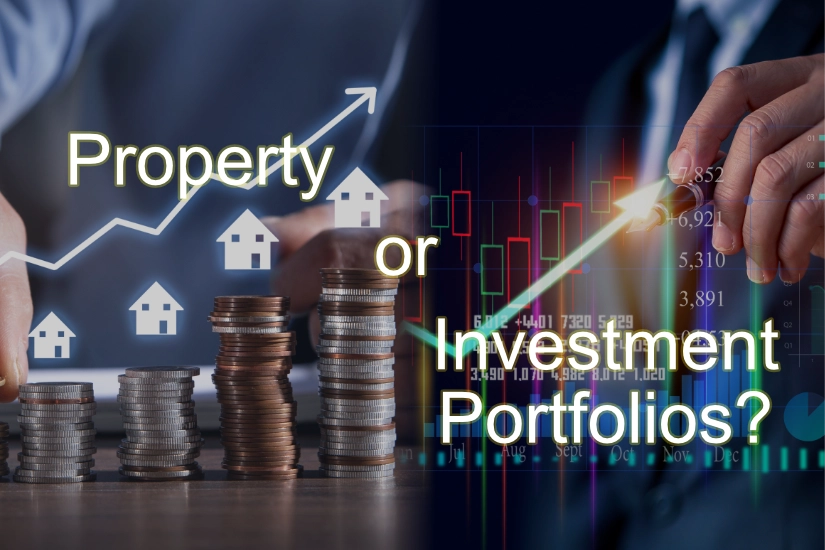Planning for retirement often involves decisions on how best to generate passive income. In Singapore, two popular options are investing in property and building a portfolio of stocks, ETFs, and unit trusts. Both strategies have their advantages and disadvantages. Here’s a comprehensive overview supported by recent statistics, followed by a clear summary comparison table.
Investing in Singapore Property for Retirement Income
Pros:
- Stable Rental Income: Rental income can provide consistent cash flow.
- Capital Appreciation: Historically, Singapore properties have shown steady appreciation.
- Leveraging Opportunities: Using financing from banks can amplify returns.
- Tangible Asset: A physical property provides psychological comfort and asset control.
Cons:
- High Initial Investment: Significant upfront costs including down payments, stamp duties, and legal fees.
- Maintenance Costs: Regular expenses for upkeep, repairs, insurance, and property taxes.
- Illiquidity: Properties cannot be quickly converted to cash in urgent situations.
- Market Volatility: Property prices and rental yields can fluctuate with market conditions.
Example Costs for Property Investment:
- Condo Purchase Price: SGD 1,000,000
- Down Payment (25%): SGD 250,000
- Buyer’s Stamp Duty (~4%): SGD 39,600
- Additional Buyer’s Stamp Duty (if applicable): up to 20% (SGD 200,000 for second property)
- Legal Fees: SGD 3,000-5,000
- Maintenance Fees: SGD 300-500 per month
- Property Tax: SGD 2,500-5,000 annually
- Mortgage Interest: Approximately 3-4% per annum
Recent Statistics: According to URA, private residential property prices rose by approximately 4.2% in 2023. Rental yields in Singapore typically range from 2.5% to 3.5% per annum (EdgeProp Singapore, 2024).
Investing in Stocks, ETFs, and Unit Trusts
Pros:
- Lower Initial Investment: Flexible investment amounts suitable for different financial situations.
- Diversification: Easily diversified across sectors, industries, and geographies.
- Liquidity: Easy to liquidate investments when needed.
- Higher Potential Returns: Historically offers higher returns compared to many asset classes over the long term.
Cons:
- Market Volatility: Significant fluctuations can occur in stock markets.
- Active Management Required: Regular monitoring, rebalancing, and reviews are necessary.
- Costs and Fees: Includes management fees, brokerage commissions, and expense ratios that can affect net returns.
Example Costs for Investment Portfolio:
- Initial Investment: SGD 250,000
- Brokerage Fees: SGD 10-25 per transaction
- Unit Trust Management Fees: Approximately 1% to 2% annually
- ETF Expense Ratios: Typically range from 0.05% to 0.50% per annum
Recent Statistics: The Singapore Straits Times Index (STI) delivered average annual returns of about 6-8% over the past decade, including dividends (SGX, 2024). Globally, the S&P 500 Index generated an average annual return of approximately 10.2% including dividends over the last 30 years (Standard & Poor’s, 2024).
Summary Comparison Table
| Factors | Singapore Property | Stocks, ETFs, Unit Trusts |
|---|---|---|
| Initial Investment | High (SGD 250,000+ upfront) | Flexible (SGD 250,000 or lower) |
| Liquidity | Low (Difficult to liquidate quickly) | High (Can sell investments quickly) |
| Maintenance & Ongoing Costs | Moderate to High (Maintenance, taxes, fees) | Low to Moderate (Brokerage, management fees) |
| Potential Annual Returns | 2.5-3.5% rental yield; ~4% capital appreciation | 6-8% STI (Singapore), ~10.2% S&P 500 (global) |
| Market Volatility | Moderate (Influenced by property market cycles) | High (Stock markets fluctuate significantly) |
| Management Required | Moderate (Property maintenance, tenant management) | High (Regular monitoring, rebalancing needed) |
| Diversification | Low (Limited to specific properties) | High (Easily diversified across sectors/geographies) |
Conclusion
Your choice between property investment and an investment portfolio should reflect your personal financial situation, risk appetite, liquidity needs, and retirement objectives. Considering diversification through a blend of both property and financial investments can effectively manage risk and enhance your overall retirement income.

